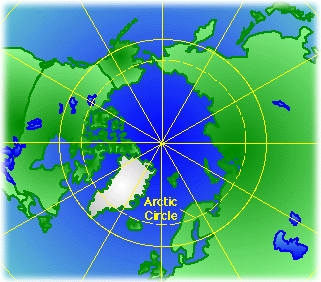
I am currently teaching a very special group of Kindergarteners as part of our school's School of Advanced Studies, also known as the SAS Program. My students, like their teacher, have an incredible love of art and science. An integral part of our studies this year has focused on linking literacy and science, and studying about our world, our place within it, and the interconnectedness of all living things. These students may be young, but they are already ardent Arctic explorers, due in no small part to the TEA Program.
I hope that my involvement in this remarkable project, and the extraordinary level of commitment that it requires, will go a long way in demonstrating that real, meaningful teaching and learning does not stop at any parcticular age, or at the classroom walls. Learning is a life-long and thrilling adventure that can literally take you to the ends of the earth.
More about my Teaching Philosophy and Background
Teaching, like art, travel and science, is an ongoing process of discovery and adventure. I am deeply committed to my students and strive to create a sense of wonderment and curiosity, stimulating the kind of interest, knowledge and scientific literacy that will lead to the scientists of the next generation. I try to teach with humor and compassion, and strongly believe that it is part of my role as an educator to encourage each student to become actively involved in the process of his or her own learning. I encourage my students to take risks, ask questions, and learn how to creatively seek out answers and alternative viewpoints. In this way, I am able to create a classroom environment that focuses on the principles of scientific investigation and thematic, cross-curricular studies of the earth; it's inhabitants, and the interconnectedness of all living things.
I come from a teaching family: my mother and father are both life-long teachers, as is my husband. It seems that teaching is quite literally in my blood. I have experience teaching all levels of elementary school students but have also worked as a public school educator with students aged five to adult, bringing my background in art, anthropology and child psychology into the classroom. My various interests in tribal art, nature, ecology, and a love of adventure have taken me around the world: traveling across Africa and India, studying tribal art and canoeing down the Sepik River in Papua New Guinea, and camel trekking through Israel and the Sinai. Now, on to the Arctic!

Change and Its Impact on Culture, Economy and identity in Three North Bering Strait Alaskan Inupiat Societies
Dr. Carol Zane Jolles, Indiana University-Purdue University, Indianapolis, Indiana
In February/March 2002, I will travel with Dr. Carol Zane Jolles (Indiana University-Purdue University, Indianapolis, Indiana), to The Alaska Native Village Of Ingaliq (Population 160) on Little Diomede Island. The island is located in Bering Strait, 2.5 miles from the Russian Border. I will take part in the first phase of Dr. Jolles's research with the Ingaliq community. The project is entitled: "Change and Its Impact on Culture, Economy and identity in Three North Bering Strait Alaskan Inupiat Societies."
I consider myself very fortunate to have been paired with such an experienced scientific researcher as Dr. Jolles, a cultural anthropologist, who has worked with the Yupik communities on St. Lawrence Island, Alaska, since 1987, and with the Little Diomede Island Inupiaq community since 1997. Little Diomede Island, about 1.5 miles wide, lies at approximately 65 N. Latitude, and 169 W longitude, just off the coast of Siberia and about 135 miles northwest of Nome, Alaska.
Our work involves interviewing Ingaliq families to collect data on the changes that have taken place in the community over several generations. The Inupiat of Ingaliq are marine mammal hunters and foragers who still depend on the sea for their living, in this Northern Arctic region where the temperatures can often reach 60 degrees below zero. Dr. Jolles will note changes in community economic life and cultural expressions such as carving, dancing and storytelling, which play important roles in community life. Our research team, which includes local community assistants and consultants, will rely especially on oral history and narrative life histories. These will be used to analyze how the community has, in Dr. Jolles's words: "¹Ä¶ simultaneously dealt with change, and maintained identity in the face of the rapid technological, economic and religious changes brought about by globalization over the past century."
I also hope to work together with the teachers and students on Little Diomede to develop a relationship between our two schools, districts, and communities. This is an incredible and unique opportunity for children from two very different worlds to interact, share experiences and learn about the very different climates, regions, habitats, and lifestyles parcticular to each set of experiences. Dr. Jolles (once a high school teacher herself) is very supportive of, and committed to, developing this educational component, and has gone to great lengths to include me as an integral member of her research team.
This project is divided among three components reflecting the three different Native communities parcticipating in the research. Dr. Jolles, with whom I will work, is the Principal Investigator. She will oversee the project and work most closely with the Little Diomede Island Native community. Dr. Deanna Kingston, (Oregon State University, Corvallis, Oregon), is the Co-Principle Investigator; she will focus on the King Island Native community living in Nome, Alaska. Mr. Herbert Anungazuk, (National Park Service, Anchorage, Alaska), will focus on the Native community of Wales, Alaska. It is with great anticipation that I look forward to parcticipating in this research project.

 Be sure to check out the images in the journal entries!
Be sure to check out the images in the journal entries!
